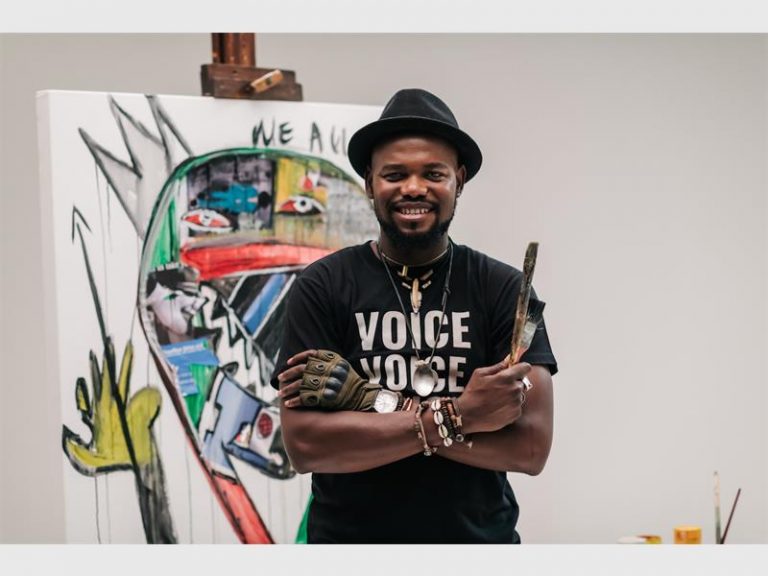Heated art discussion at the Blessing Ngobeni Art Prize exhibition
By Edward Tsumele
It is not so often that the public gets so close and personal with visual artists, and engage with the artists about their art practice, their processes as well as their views on the contemporary conditions on human existence.
However those who attended a panel discussion at the opening of the Blessing Ngobeni Art prize Exhibition, entitled Politics of Now involving some of the well known visual voices on the South African contemporary scene were given that privilege of interacting with Blessing Ngobeni, Lady Skolie and Nandipha Mtambo, Nicholas Hlobo on Saturday, September 12. The discussion, moderated by art historian and artist, Dr Same Mdluli, was as interesting as it was heated.

The public often does not get to meet artists in person, and interact with them as an artistic exercise is often a lonely business confining an artist to working often alone in his studio, and their views about the world they inhabit, and which often inspires the process of creating works, is often not known to the public.
But in a frank discussion, that overran the time allocated by the hosts Aspire Auctions held at their Illovo offices, demonstrated the fact that artists’ views of the world they live in are, as divergent as the visual language they develop in their processes. The discussion was quite fired up as the panelists constantly fought for the right to the microphone, to make sure that their views on controversial issues such as whether the work of formal trained artists is better than that of ‘the outsiders’ as Hlobo put it when referring to self-taught African artists.
The role of Western art education was constantly questioned by both self taught and formally trained artists on the panel. Ngobeni for example, a mainly self taught artist who honed his artistic skills and techniques of sketching while serving time behind bars as a youngster who found himself on the wrong side of the law, feels that the ‘outsiders’ art is at different levels way better than that often produced and informed by Western conventions of artistic practice with rigid rules applied to the process and rules of different convention Western art practice.
Hlobo, a formally trained artist who graduated from the then Wits Technikon (now University of Johannesburg) in the 90s, concurred with Ngobeni, and so did Lady Skolie. However Mtambo, a masters degree fine art graduate from Michaelis, and who dabbles as a fine art lecturer at the University of Witwatersrand, between practicing art, differed with her colleagues, insisting that education of a formal nature is important and necessary for young artists to acquire art practice techniques.

The issue of mentorship and as to whether young artists can benefit from fellow established artists’ mentorship proved to be highly contentious during the discussion.
Hlobo, a colourful and outspoken character outside his studio, again vehemently dismissed the idea that fellow artists can mentor another artist, insisting that the larger world is in fact the mentor that the young artists need , and not a fellow artist as they risk mimicking the art practice of the mentor instead of thinking for themselves and organically develop their own visual language. All the panelists seemed to agree on this point.
“There was once an attempt to get mentorship for me with a fellow experienced artist. That mentorship was a total failure as I ended up doing my own thing while the mentoring artists did his. My mentor is in fact my grandmother,” Hlobo boldly declared.
“The problem with especially young student artists is the expectation that the teacher or mentor will spoon feed them, instead of them growing their own curiosity and observing life according to their own backgrounds. Our home backgrounds are different and therefore it becomes difficult to mentor someone from a different home background whose personal circumstances are different from your own,” reasoned Mtambo.
“I often say that I got my degree from the streets of Johannesburg, and it is observing life in the streets that informs my art practice,” said Ngobeni.
“My mentors are not artists, but other people in different professions. My mentors actually are architects,” said Skolie who with Hlobo gave the moderate a hard time to managing the discussion as they seemed to fight constantly for the right to the mike to put their often strongly expressed points through.
At the end the discussion seemed to be dragging on and on, and you could see Ruarc Peffer, the managing director of Aspire worried about time, being on edge sometimes, wanting to intervene as especially Lady Skolie and Hlobo, never wanted to let go of the right to the microphone.
At the end, however it was a great art debate that is necessary on the South African contemporary art scene, If not to ventilate on pertinent current issues on the art scene, but to get the public and collectors to get to know the artists who are behind the work that they collect. More such debates are needed and necessary. Perhaps though for future art discussions Lady Skolie and Hlobo should not be on the same panel, especially If time is tight. The Blessing Ngobeni Art Prize exhibition entitled Politics of Now, curated by Tlotlo Lobelo, which is a fundraiser, is currently on at Aspire in Illovo, and collectors can either make an appointment to visit the place in person with Covid 19 conditions applicable, or buy on line. You can view the online e-catalogue flipbook here: https://issuu.com/aspireartauctions/docs/bnap_ecatalogue_2020









